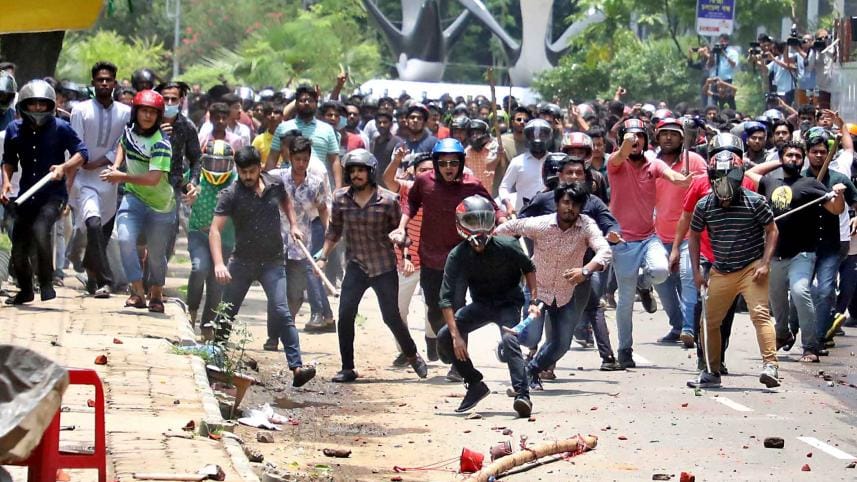Democracy crushed under BCL’s boots?

Bangladesh Chhatra League (BCL) has hogged headlines once again. Last week, the student wing of the ruling party, armed with sticks, iron rods and machetes, launched an attack on some leaders and activists of their arch-rival Jatiyatabadi Chhatra Dal (JCD), the student wing of BNP, near the Central Shaheed Minar when the latter tried to enter the Dhaka University campus for a scheduled programme. The attack resulted in chases and counter-chases that continued sporadically for several hours, turning the campus into a battlefield. Video footage and photographs showed how the BCL members beat up their opponents mercilessly, leaving about 30 JCD activists—including some female members—injured.
What earned the JCD such a thrashing? They wanted to hold a press briefing to clarify the remarks made by one of their leaders about the prime minister. During a rally near the Raju Sculpture on May 22, JCD General Secretary Saif Mahmud criticised Prime Minister Sheikh Hasina for her remarks on BNP chief Khaleda Zia over the Padma Bridge issue. Saif's remarks reportedly made the BCL furious, and he was supposed to clarify his comments that day. But before he could make his point, the JCD members were beaten up and driven out of the campus. Two days later, when they tried to bring out a procession in protest of the attack, BCL men again swooped on them near the High Court area. A battle ensued soon, with the BCL activists chasing some of their rival members into the High Court compound. The incident, which left 50 people injured, set off a chain reaction, with members of the ruling party attacking members of the JCD and its parent organisation in some places across the country.
BCL leaders, while justifying the attack, said "progressive students" had united with them to protest against "criminal activities." BCL DU unit General Secretary Saddam Hussain said it was done to "protect the general students of the university and preserve DU's academic environment." He warned that students would not return home until the "criminal forces" were rooted out. Now the question is, has the BCL been given the responsibility to protect the academic environment of Dhaka University? Then what is the role of the university administration? In fact, the DU administration's role was all but dubious. Firstly, it failed to create an atmosphere conducive to peaceful coexistence of all student bodies affiliated with the political parties. Secondly, it did not take any visible measures to prevent the violent clashes last week. All the DU authorities did was file a case with Shahbagh Police Station against unnamed people, though photos and videos of BCL activists wielding weapons went viral on social media and were run by newspapers. Eventually, it was the JCD members who were accused in the cases filed by the BCL; police detained some of them, too.
JCD has been out of the DU campus since 2010, a year after the Awami League came to power. They were ousted from all the residential halls and could not enter the campus, let alone hold any political programmes. However, towards the end of 2018, JCD members were allowed on the campus because of the Dhaka University Central Students' Union (Ducsu) polls, held in March 2019 after a 28-year hiatus. Since then, JCD leaders and activists have been seen holding brisk processions and meetings on the campus, although the university remained shut for a large period of the last two years because of Covid-19 shutdown.
Now, the BCL has driven them out again and kept their guards up so that JCD members can't enter the campus. Isn't this move tantamount to curtailing JCD's rights to assembly and protest? Peaceful assembly is a fundamental right and a key pillar for civic space. Article 37 of our constitution states, "Every citizen shall have the right to assemble and to participate in public meetings and processions peacefully and without arms…"
But the way JCD's programmes at DU were thwarted goes against the democratic norms. It was as if the JCD's efforts to enter the campus was a crime, but not the BCL's attacks on them. The right to peaceful assembly in a democracy cannot be hindered just because the protesters hold views contrary to that of those in power. The beauty of democracy is that it's all about accommodating differences in political opinion. Unfortunately, that's what is lacking in the BCL, which has been in supreme control over the public universities in the country for more than 12 years. Their actions over the years demonstrate that they hardly care about the words given by the high-ups in their mother organisation—that processions and rallies of the opposition would not be disrupted.
After the Ducsu polls, which was mired by allegations of irregularities, many had hoped that a positive change would come in student politics in Bangladesh. But the BCL members' repressive attitude towards the others indicates that nothing much has changed, and they are not only constricting the space for the opposition, but also earning the student organisation—which played a glorious role in the history of the nation—a bad name.
Wasim Bin Habib is deputy planning editor at The Daily Star.




 For all latest news, follow The Daily Star's Google News channel.
For all latest news, follow The Daily Star's Google News channel.
Comments